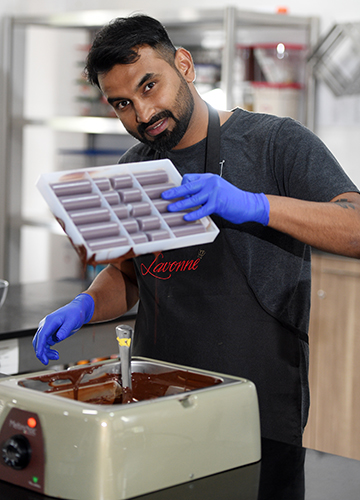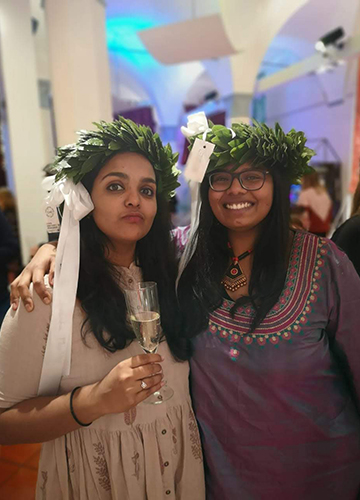Whoever knew seaweed could be interesting? If it evokes for you the image of slimy, free-floating goo, you are not alone. But there is far more to seaweed than what meets the eye. To find out, two culinary adventurers, Elizabeth Yorke and Anusha Murthy, took a deep-dive into the world of seaweed. Every Saturday, as part of their collective, Edible Issues, they explored the seaweed landscape by conversing with coastal communities, researching seaweed forests and finding ways to consume seaweed responsibly without adversely affecting biodiversity. And for good measure, they threw in a few delicious seaweed recipes that would forever delink the word ‘slime’ from seaweed in your mind.
Edible Issues was started by the two women in 2018 to foster conversations around the Indian food system. The two pored over more than 200 articles in a week to “sift out signals that we thought would point to a particular food future”. They then decided to put these links together in a newsletter that they sent out in February 2018. “From agriculture, policy, tech and startups—we looked for news that was a signal to what the future of food might look like for India,” they say. Over four years, they have sent more than 70 newsletters, but the newsletters were only the starting point. Soon, their culinary repertoire expanded to include meet-ups, curated events and various projects and experiences. From discussing antibiotic-free chai and space idlis to going bananas (We mean that literally; they embarked on a one-month exploration of banana policies, markets and the future of the fruit), the two catapulted the conversation around food in the country to a whole new level.
While seaweed might need some getting used to, you know what does not? A moist chocolate cake made with hazelnuts and Thellicherry pepper—a masterpiece created by Chef Vinesh Johny, the Willy Wonka of India’s Chocolate Factory. Other than his wizardry in whipping up desserts, he also co-founded the Lavonne Academy of Baking Science & Pastry Arts in Bengaluru in 2012—India’s first specialised international baking school— along with Avin Thalliath and Lijo Chandy. Today, around 1,500 students attend the academy’s various courses each year, which include a full-time Diplome de Patisserie to shorter courses and weekend classes for amateur bakers.
“My mother’s elder sister owned a bakery, and among all my aunts hers was the only house I was excited to visit,” says Johny with a laugh. “You would get to eat a lot of yummy stuff, not the usual snacks that came from the store next door.”
So, what does a connoisseur of pastries and two food-savvy women in India have in common? A list and a dream.
The list: All three recently featured in the ‘50 Next’ list of young innovators across the globe—from activists and scientists to chefs and entrepreneurs—who are “changing the world of gastronomy in unique and interesting ways”. The ‘50 Next’ list is brought out by the same organisation behind ‘The World’s 50 Best Restaurants’ and ‘The World’s 50 Best Bars’, which has been celebrating the best restaurants and bars across the globe for the last 20 years.
The dream: A shared passion to build a more sustainable food future for the country. None of them are into food forecasting. Yet, all of them have ideas of what the future could look like. “We do the work we do because we want to give people the choice to question what future they want,” says Yorke. “So, we do multiple exercises in which we put together these signals [that could point to the future].”
She gives an example. Have you ever thought of connecting the microorganisms in your gut to drone delivery systems to Zomato and Swiggy? So, imagine this. If Zomato and Swiggy are able to collect and store information today on what we eat and when we eat, can they, in the next 30 years, have access to the ingestible sensors in our gut? So, when you feel hungry, the gut sensor immediately informs Swiggy and Zomato what you want to eat, which is then delivered on drones. With advances in our knowledge of nutrition and gut bacteria, and food delivery apps already testing out drones, this might not be such a far-fetched future, feel Yorke and Murthy.
You do not normally associate the words ‘responsible’ and ‘sustainable’ to a blueberry cheesecake or a chocolate mudpie. The super-rich death-by-chocolate is a literal death wish. A decadent lemon meringue pie is all about instant gratification—that moment of what-the-hell indulgence that you know is soon going to shape-shift into love handles. Still, there is a way to eat and make sweets responsibly, says Johny. “Have you done enough research to find alternate sugars?” he asks. “Is it good or not to change fats if required? Can you look at zero-kilometre bakeries where you are only dependent on the fruits that come from nearby markets and the butters that are being made in India? That becomes a lot more sustainable where you are making good quality products without importing too many things. It is all moving towards that, which is very exciting.”
Maybe the future cannot be predicted, but it sure can be shaped, and that is what this trio is doing. They are educating, bringing awareness and ushering in a future in which we will not regret the decisions of the past. Although, we do hope that future will include lemon meringue pies. Love handles be damned.



